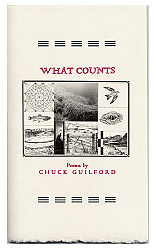— the no praise/no blame method
Some conversation starters:
|
|
|
|
|
|
|
|
|
|
As you discuss, remember —
These are not finished poems. They are more like quick sketches for a painting, or video clips for a movie. The writer needs to spot patterns of image, sound, and meaning in the draft. To ask--where might the line breaks come? The stanza breaks? What is most compelling? As a reader, an audience, you can help the writer see the poem's emerging potential.
If you notice problems,call them to the writer's attention,but in a way that points toward revision. Also, notice that what looks problematic for you, may not appear so for another reader. Give the writer a "movie of your mind" as it processes the poem. Don't judge or evaluate, but let the writer see how the poem affects you. What do you see, think, feel, as you read the poem?
It's the writer's poem--not yours. Don't try to make the poem what you want it to be. Help the writer make it what she wants it to be. And remember, it's always the writer who must go back into the poem and make tough decisions about form and content, substance and style, informed largely by your comments.
Point out what's strong.A poem shared is a gift given. In response, don't just gush vague, insincere praise, but let the writer know he has been heard, that his poem is valued. Point to specific passages--words, images, phrases--and tell how and why they speak to you.
A Sharing Process —
The writer reads the draft aloud while other group members listen, maybe jotting down notes.
The person to the writer's left gives a brief, non-evaluative comment on the poem, noting its central concern, most striking features, major divisions, images and metaphors, and so on.
Other group members use these opening comments as launch points for further discussion. Group members discuss both their reactions and the poem itself, while the writer listens quietly, taking it all in. Group members talk to each other, not to the writer.
Look closely at the opening. What sort of tone does it establish? Does it invite further reading? Does it set up expectations of what will follow?
Focus in on specific details. Notice line breaks, stanzas, rhythms, patterns of sound and meaning. Consider the speaker's voice and tone. Notice connotation, irony, ambiguity.
Look closely at the ending. Does it satisfy the expectations set up at the beginning? Does it leave you with a sense of satisfaction and completion?
Finally, ask the writer to comment and especially to raise any questions that haven't already been explored.

